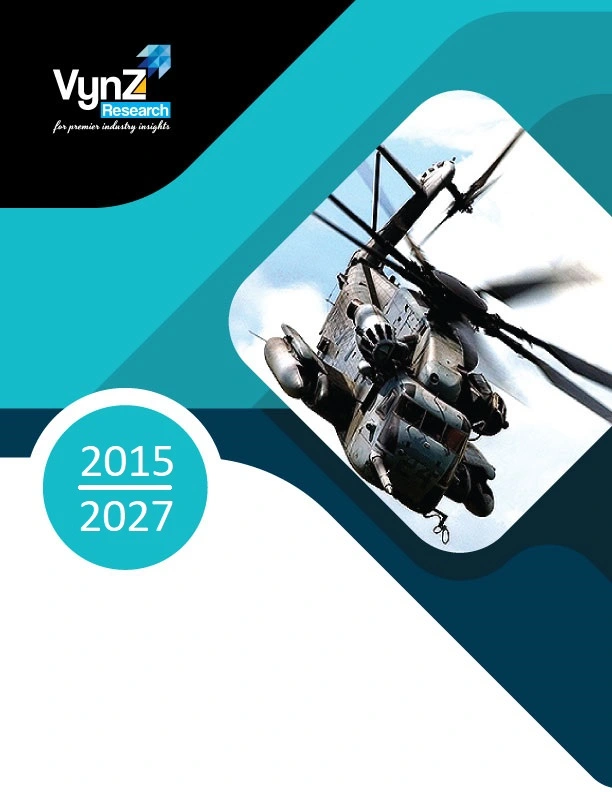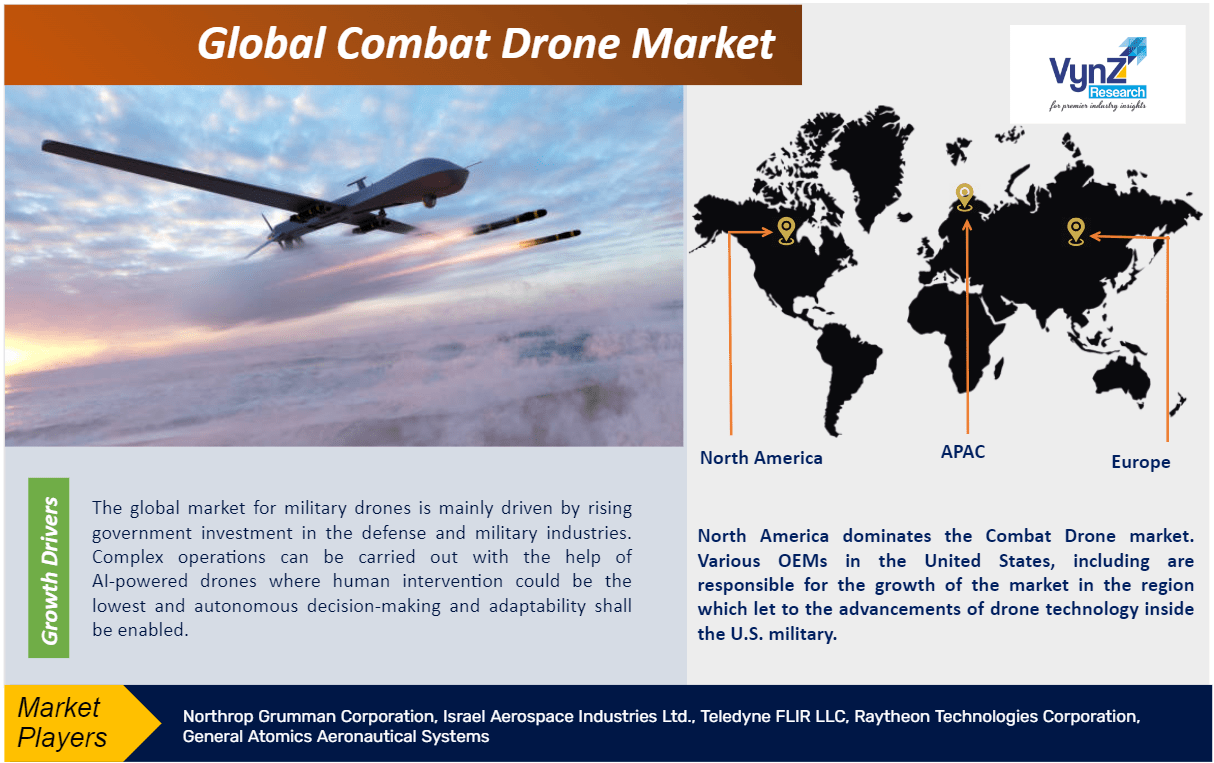| Status : Published | Published On : Mar, 2024 | Report Code : VRAD12027 | Industry : Aerospace and Defense | Available Format :

|
Page : 187 |

Global Combat Drone Market - Analysis and Forecast (2025-2030)
Industry Insights By Type (Fixed Wing, Hybrid and Rotary Wing), By Range (Visual Line Of Sight (VLOS), Extended Visual Line Of Sight (EVLOS), and Beyond Line Of Sight (BLOS)), By Technology(Remotely Operated Drones, Semi-Autonomous Drones, and Autonomous Drones), By Applications (Combat Operations, Delivery and Transportation, Intelligence, Surveillance, Reconnaissance and Target Acquisition (ISRT) and Others), By Geography (North America, Europe, Asia-Pacific, Latin America, Middle East And Africa)
Industry Overview
Global Combat Drone Market is anticipated to grow from USD 6.8 billion in 2023 to USD 12.4 billion in 2030 at a CAGR of 8.2% during the forecast period from 2025 to 2030.

An unmanned aerial vehicle that is used for reconnaissance, surveillance, intelligence, target acquisition and carries aircraft ordnance such as missiles, ATGMs and bombs in drone attacks is known as combat drone. Normally, drones are controlled by a human. The dynamic evolution of regulatory frameworks and continuous advancement of technology to empower more effective and efficient responses to serious situations are the factors responsible for rising demand for combat drones.
Market Segmentation
Insight by Type
Based on type, the Combat Drone Market is segmented into Fixed Wing, Hybrid and Rotary Wing. Fixed wing segment is anticipated to develop significantly during the forecast period due to the increase in investments in the Combat Drone market trends and its capacity to travel great distances, fly over longer periods and operate at high altitudes.
Insight by Range
The global military drone market is divided into categories such as visual line of sight (VLOS), extended visual line of sight (EVLOS), and beyond line of sight (BLOS) on the basis of range. The extended visual line of sight segment is projected to dominate the global combat drone market throughout the forecast period.
Insight by Technology
On the basis of technology used, the Combat Drone Market is segregated into remotely operated drones, semi-autonomous drones, and autonomous drones. The remotely operated drones segment is expected to hold the largest share of the global military drone market during the forecast period. These unmanned aerial vehicles are typically used for monitoring, reconnaissance, and strike missions, with a human operator controlling their flight.
Insight by Applications
Based on applications, the Combat Drone Market is segmented into combat operations, delivery and transportation, intelligence, surveillance, reconnaissance, and target acquisition (ISRT), and others. The intelligence, surveillance, reconnaissance, and target acquisition (ISRT) segment dominated the market as ISRT missions, that impact military operations, can employ drones to gather and process data on the operational environment.
Global Combat Drone Market Report Coverage
|
Report Metric |
Details |
|
Historical Period |
2018 - 2023 |
|
Base Year Considered |
2024 |
|
Forecast Period |
2025 - 2030 |
|
Market Size in 2024 |
U.S.D. 6.8 Billion |
|
Revenue Forecast in 2030 |
U.S.D. 12.4 Billion |
|
Growth Rate |
8.2% |
|
Segments Covered in the Report |
By Type, By Range, By Technology, By Applications |
|
Report Scope |
Market Trends, Drivers, and Restraints; Revenue Estimation and Forecast; Segmentation Analysis; Impact of COVID-19; Companies’ Strategic Developments; Market Share Analysis of Key Players; Company Profiling |
|
Regions Covered in the Report |
North America, Europe, Asia-Pacific, Latin America, Middle East And Africa |
Industry Dynamics
Growth Drivers
The ongoing advancements in artificial intelligence systems shall drive the growth of the combat drones market. The global market for military drones is mainly driven by rising government investment in the defense and military industries. Complex operations can be carried out with the help of AI-powered drones where human intervention could be the lowest and autonomous decision-making and adaptability shall be enabled. There is increased use of UCAV in military applications, which surged the use of UAV in disaster relief operations, and improvements in frameworks regulatory related to aerial operations are the growth drivers of Unmanned Combat Aerial Vehicle (UCAV). Combat drone’s market size is projected to grow as they are more capable of handling more complex missions.
Restraints
Ground based air defense systems can target air large tanker aircraft that, can be easily targeted which endangers the security system of a country. Tanker aircraft is heavy and slow moving compared to the recipient aircraft, which may give the enemy a chance to fire during an combat drone process. Specialized pilot training is necessary for combat drone procedure which is restricting the market from growing. Also the inherent risk of mid-air collisions during AAR marks the limitations for the growth of Combat Drone market. Drones can fly at various altitudes and require skilled personnel to operate them while flying at a low altitude.
Geographic Overview
- North America
- Europe
- Asia Pacific (APAC)
- Latin America
- Middle East and Africa
North America dominates the Combat Drone market. Various OEMs in the United States, including are responsible for the growth of the market in the region which let to the advancements of drone technology inside the U.S. military. The industry has grown as a result of increasing investment by major regional companies. Regional expansion is to be propelled in unmanned aerial vehicle exports from the United States.
Key Players Covered in the Report
Some of the major players in this market are Northrop Grumman Corporation, Israel Aerospace Industries Ltd., Teledyne FLIR LLC, Raytheon Technologies Corporation, General Atomics Aeronautical Systems
Recent developments by Key Players
As part of the US Air Force’s (USAF) Off-Board Sensing Station (OBSS), General Atomics Aeronautical Systems (GA-ASI) has revealed its new uncrewed combat aerial vehicle (UCAV), the XQ-67A. The drone resembles the Avenger, MQ-25 Stingray tanker and the XQ-58 Valkyrie. The images have been released by the manufacturer that showed the drone has a main wing with a low sweep, a splayed v-tail, a top-mounted dorsal engine intake and a retractable tricycle landing gear.
Recently 31 remotely piloted military aircraft shall be bought by the US government from General Atomics Aeronautical Systems Inc. The deal is worth USD 3.99 billion and includes weapons with its associated products and services.
The Combat Drone Market report offers a comprehensive market segmentation analysis along with an estimation for the forecast period 2025–2030.
Segments Covered in the Report
- By Type
- Fixed Wing
- Hybrid and Rotary Wing
- Business & General AviationHemp
- By Range
- Visual Line Of Sight (VLOS)
- Extended Visual Line Of Sight (EVLOS)
- Beyond Line Of Sight (BLOS)
- By Technology
- Remotely Operated Drones
- Semi-Autonomous Drones
- Autonomous Drones
- Applications
- Combat Operations
- Delivery and Transportation
- Intelligence
- Surveillance
- Reconnaissance and Target Acquisition (ISRT)
Region Covered in the Report
- North America
- U.S.
- Canada
- Mexico
- Europe
- Germany
- U.K.
- France
- Italy
- Spain
- Russia
- Rest of Europe
- Asia-Pacific (APAC)
- China
- Japan
- India
- South Korea
- Rest of Asia-Pacific
- Rest of the World (RoW)
- Brazil
- Saudi Arabia
- South Africa
- U.A.E.
- Other Countries
.png)
Frequently Asked Questions
Purchase Options
Latest Report
Research Methodology
- Desk Research / Pilot Interviews
- Build Market Size Model
- Research and Analysis
- Final Deliverabvle
Connect With Our Sales Team
- Toll-Free: 1 888 253 3960
- Phone: +91 9960 288 381
- Email: enquiry@vynzresearch.com
Combat Drone Market
